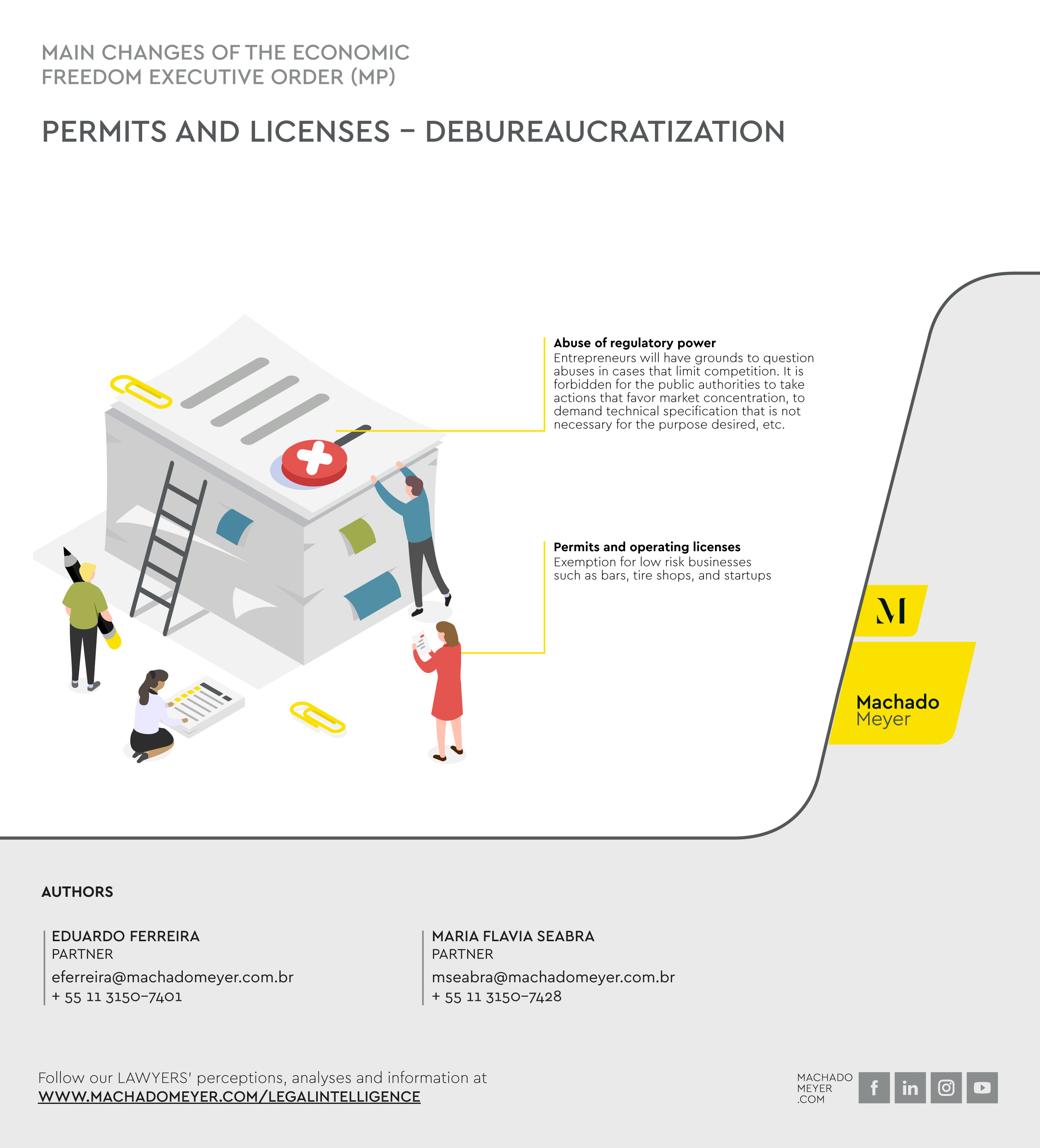One of the most important changes brought about by Federal Law No. 13,874/19, known as the Economic Freedom Law and arising from the conversion into law of Executive Order No. 881/19, is the waiver of prior licensing for the exercise of economic activities defined as being “low risk." Subsection I of article 3 of the law provides for the possibility of waiving the presentation of prior licenses, authorizations, registrations, or permits for the regular operation of low-risk economic activities that may be performed by any individual or legal entity essential to Brazil’s development and economic growth.
In order to determine what constitutes a low-risk economic activity, the law, in its paragraph 1, provides that this classification must be the result of an act of the Federal Executive Branch, in the absence of specific state, federal district, or municipal legislation. It is worth remembering, on this point, that the competence for land planning and defining activities is, in general, assigned to municipalities.
In order to comply with the provision of law with a general and subsidiary standard, the Steering Committee of the National Network for the Simplification of Registration and Legalization of Companies and Business (CGSIM) published, on June 12, 2019, in the Federal Official Gazette, Resolution No. 51, which deals with the definition of low-risk economic activities in order to comply with MP 881/19.
The resolution conceptualizes low-risk (or “low-risk A”) economic activities as those that do not call for a site visit for their continuous and regular exercise, and classifies 287 activities into this concept. Comparatively, in the city of São Paulo, low-risk activities are classified in Decree No. 57,298/16 and conceptualized in Law No. 16,402/16. Under the new legislation, they must prevail for the purpose of dispensing with the documentation necessary for the regular performance of these activities.
As for the scope of the waiver of licensing, the law is clear in providing that “public acts of liberation of economic activity” are waived. Thus, in a restrictive interpretation, the waiver of licensing may conceptually encompass municipal business licenses, but should not, in theory, encompass Fire Inspection Reports and the Certificate of Completion of Works (Inhabit), since both refer to the good standing of the building and not just the activities to be performed there.
In this respect, although the law does not expressly provide for its application in environmental issues, there is also room to hold that, in relation to these “low impact” activities, there is also no need to submit to environmental licensing.
For situations that require release from the Federal Public Administration or even from states and municipalities that have voluntarily bound themselves to this procedure, subsection IX of article 3 provides that, after the presentation of all the necessary supporting elements for the procedure to release the economic activity, the applicant will be informed of the maximum period stipulated for the review of its application. In addition, once the deadline has elapsed without a response from the competent authority, silence will imply tacit approval for all purposes, except in cases expressly forbidden by law, such as the in the case of a financial commitment by the Public Administration or when the procedure relates to tax issues.
The base text sent for presidential signature provided a caveat to this provision regarding environmental licensing, providing that the specific deadline was not to be confused with those of Complementary Law No. 140/11, which regulates the competence for licensing and defines the deadlines for processing environmental licensing proceedings. However, this caveat was the subject of a presidential veto, on the grounds that the provision was unconstitutional because it violated the government's duty of environmental prevention.
Complementary Law No. 140/11 provides that expiration of the licensing deadlines, without the issuance of an environmental license, does not imply tacit issuance thereof, thus representing a prohibition expressed in law. Therefore, the provisions of Law No. 13,874/19 regarding deadlines for public acts of release, although it may raise doubts, will not apply to environmental licensing.
These changes should expedite the opening of low-impact establishments, generally related to office activities and the provision of technical services, such as engineering, architecture, advertising, and general administrative support. The changes should also affect administrative licensing procedures, as they provide that the licensing agency is bound to meet deadlines vis-à-vis the interested party. Under the law, however, the loosening of the system is not complete. The competent supervisory bodies will continue to be in charge of supervising and assessing establishments that are in disagreement with the law, either sua sponte or as a consequence of a complaint sent to the competent authority.
Another aspect of the Economic Freedom Law to be highlighted is article 3, subsection XI, which eliminates the requirement for abusive compensatory or mitigating measures against private parties in impact studies or other releases of economic activity under urban planning law. The requirement of execution or provision of any kind for areas or situations beyond those directly impacted by the economic activity, as well as unreasonable or disproportionate measures, are classified as abusive, as are those that were already planned before the requirement of the private party, except in cases of impact from the activities in this planned measure.


